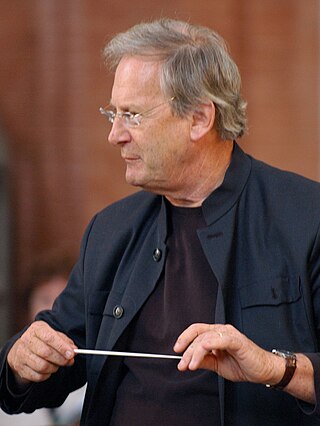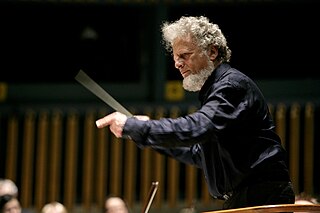
Conducting is the art of directing a musical performance, such as an orchestral or choral concert. It has been defined as "the art of directing the simultaneous performance of several players or singers by the use of gesture." The primary duties of the conductor are to interpret the score in a way that reflects the specific indications in that score, set the tempo, ensure correct entries by ensemble members, and "shape" the phrasing where appropriate. Conductors communicate with their musicians primarily through hand gestures, usually with the aid of a baton, and may use other gestures or signals such as facial expression and eye contact. A conductor usually supplements their direction with verbal instructions to their musicians in rehearsal.

Sir John Eliot Gardiner is an English conductor, particularly known for his performances of the works of Johann Sebastian Bach, especially the Bach Cantata Pilgrimage of 2000, performing Bach's church cantatas in liturgical order in churches all over Europe, and New York City, with the Monteverdi Choir, and recording them at the locations.
John Harris Harbison is an American composer, known for his symphonies, operas, and large choral works.
Gil Shaham is an American violinist of Jewish descent.

Dominick Argento was an American composer known for his lyric operatic and choral music. Among his best known pieces are the operas Postcard from Morocco, Miss Havisham's Fire, The Masque of Angels, and The Aspern Papers. He also is known for the song cycles Six Elizabethan Songs and From the Diary of Virginia Woolf; the latter earned him the Pulitzer Prize for Music in 1975. In a predominantly tonal context, his music freely combines tonality, atonality and a lyrical use of twelve-tone writing. None of Argento's music approaches the experimental, stringent avant-garde fashions of the post-World War II era.

Westminster Choir College (WCC) is a historic conservatory of music currently operating on the campus of Rider University in Lawrenceville, New Jersey. Rider's College of Arts and Sciences, the college under which the historic institution has been reorganized, consists of Westminster Choir College as well as three additional schools.
Bernard Rands is a British-American contemporary classical composer. He studied music and English literature at the University of Wales, Bangor, and composition with Pierre Boulez and Bruno Maderna in Darmstadt, Germany, and with Luigi Dallapiccola and Luciano Berio in Milan, Italy. He held residencies at Princeton University, the University of Illinois, and the University of York before emigrating to the United States in 1975; he became a U.S. citizen in 1983. In 1984, Rands's Canti del Sole, premiered by Paul Sperry, Zubin Mehta, and the New York Philharmonic, won the Pulitzer Prize for Music. He has since taught at the University of California, San Diego, the Juilliard School, Yale University, and Boston University. From 1988 to 2005 he taught at Harvard University, where he is Walter Bigelow Rosen Professor of Music Emeritus.

David "Dudu" Fisher is an Israeli cantor and performer, best known for his Broadway performance as Jean Valjean in the musical Les Misérables.

Craig D. Jessop is an American academic, musician and singer best known for his tenure as the music director of the Mormon Tabernacle Choir (Choir) from 1999 to 2008.
Simon Arthur Sargon was a composer, pianist, conductor, music educator, and major creative figure in contemporary American Jewish music. His compositions include liturgical and secular pieces; opera and musical theatre; works for youth ensemble; choral and art song; and chamber ensemble and symphonic works.

Gil Shohat is an Israeli classical music composer, conductor, pianist and lecturer.

Yannis Markopoulos was a Greek composer.

Arthur William Oldham OBE was an English composer and choirmaster. He founded the Edinburgh Festival Chorus in 1965, the Chorus of the Orchestre de Paris in 1975, and the Concertgebouw Orchestra Chorus in Amsterdam in 1979. He also worked with the Scottish Opera Chorus 1966–74 and directed the London Symphony Chorus 1969–76. For his work with the LSO Chorus, he won three Grammy Awards. He was also a composer, mainly of religious works, but also a ballet and an opera.

Mátti Kovler is a Russian-born Israeli-American composer and creator of new music theatre. Called by Steve Smith of The New York Times “a potentially estimable operatic composer in the making,” his music has been compared to Leonard Bernstein's.

Dov (Dubi) Seltzer is a Romanian-born Israeli composer and conductor.

James Burton is a British conductor and composer. He is currently the Boston Symphony Orchestra Choral Director and Conductor of the Tanglewood Festival Chorus. He also holds the position of Director of Orchestral Activities and Master Lecturer in Music at Boston University.

William Weiner is an Armenian–Israeli composer, violinist and vocalist; Meritorious Worker of Art of Armenia (2008); a member of the Israel Composers League (2013); president of the Jewish cultural center "Menorah" in Armenia (1994), and director of the Yerevan State Chamber Choir (2018).

Julian James Wachner is an American composer, conductor, and keyboardist. From 2011 to 2022, he served as the Director of Music and the Arts at Trinity Wall Street, conducting the Choir of Trinity Wall Street, the Trinity Baroque Orchestra, and NOVUS NY. Wachner recorded five albums with these ensembles, primarily for the Musica Omnia label. From 2008 to 2017, he served as the Director of The Washington Chorus. In March 2018, Wachner was named Artistic Director of the Grand Rapids Bach Festival, an affiliate of the Grand Rapids Symphony, in Grand Rapids, Michigan.

Isaak Tavior is a pianist, composer and conductor. He was born in Haifa, Israel on 18 September 1943 to Rosa and Avraham Vichodetz. Tavior was the recipient of the Prize for Creativity in the field of Zionism in 2012, granted him by the Israeli Minister of Culture, Limor Livnat, for his 2004 composition "Vision of the Valley of Dry Bones" named for the prophecy of the same name.

Andrzej Rozbicki, also known as Andrew Rozbicki, is a Polish-Canadian conductor, music educator, producer and promoter of Polish music in Canada and United States. He is the founder and artistic director of Celebrity Symphony Orchestra. He is a Music Educator with Toronto Catholic District School Board.















